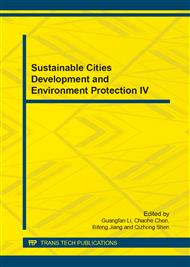[1]
D.N. Tseytin, D.V. Nemova, E.V. Kurasova: Avtonomnaya energoustanovka s kompleksnyim energoeffektivnyim elektroobespecheniem, Stroitelstvo unikalnyih zdaniy i sooruzheniy. № 5. (2013). pp.1-11.
Google Scholar
[2]
N.I. Vatin, D.V. Nemova: Povyishenie energoeffektivnosti zdaniy detskih sadov, Stroitelstvo unikalnyih zdaniy i sooruzheniy. № 3. (2012) P. 52-76.
Google Scholar
[3]
V.G. Gagarin: Teplofizicheskie problemyi sovremennyih stenovyih ograzhdayuschih konstruktsiy mnogoetazhnyih zdaniy, Akademiya. Arhitektura i stroitelstvo. (2009), № 5. pp.297-305.
Google Scholar
[4]
D.N. Tseytin, D.V. Nemova, E.V. Kurasova, Autonomous power installation with complex power effective electroproviding, Construction of Unique Buildings and Structurep. № 5. (2013) pp.1-11.
Google Scholar
[5]
A.P. Gorshkov: Energoeffektivnost v stroitelstve: voprosyi normirovaniya i meryi po snizheniyu energopotrebleniya zdaniy. Inzhenerno-stroitelnyiy zhurnal. (2010) № 1(11). P. 9-13.
Google Scholar
[6]
A.P. Gorshkov A.A. Gladkih: Meropriyatiya po povyisheniyu energoeffektivnosti v stroitelstve, Academia. Arhitektura i stroitelstvo. № 3. (2010) P. 246-250.
Google Scholar
[7]
P. Gorshkov: Energoeffektivnost v stroitelstve: voprosyi normirovaniya i meryi po snizheniyu energopotrebleniya zdaniy, Inzhenerno-stroitelnyiy zhurnal. № 1. (2010) P. 9-13.
Google Scholar
[8]
D.V. Nemova: Analiz tselesoobraznosti uvelicheniya tolschinyi teploizoliruyuschego sloya v sistemah navesnyih ventiliruemyih fasadov (NVF) v tselyah povyisheniya energoeffektivnosti, Vestnik Moskovskogo gosudarstvennogo stroitelnogo universiteta. № 7. (2011).
Google Scholar
[9]
D.V. Nemova: Analiz celesoobraznosti uvelichenija tolshhiny teploizolirujushhego sloja v sistemah navesnyh ventiliruemyh fasadov (NVF) v celjah povyshenija jenergojeffektivnosti, Vestnik Moskovskogo gosudarstvennogo stroitel'nogo universiteta. № 7. (2011).
Google Scholar
[10]
V.N. Bukhartsev, M.R. Petrichenko: Condition of mechanical-energy balance of an integral flow with a variable rate, Hydrotechnical Construction. №35 (4). (2001) P. 189-194.
DOI: 10.1023/a:1011669518499
Google Scholar
[11]
M.R. Petrichenko: Nonsteady filtration in a uniform soil mass, Power Technology and Engineering. №46 (3). (2012) pp.198-200.
DOI: 10.1007/s10749-012-0331-z
Google Scholar
[12]
V.N. Bukhartsev, M.R. Petrichenko: Problem of filtration in a uniform rectangular soil mass is solved by variational principles, Power Technology and Engineering. №46 (3). (2012).P. 185-189.
DOI: 10.1007/s10749-012-0329-6
Google Scholar
[13]
V.N. Bukhartsev, M.R. Petrichenko: Nonsteady filtration in a uniform soil mass, Power Technology and Engineering. №46 (3). (2012) pp.1-3.
DOI: 10.1007/s10749-012-0331-z
Google Scholar
[14]
V.N. Bukhartsev, M.R. Petrichenko: Problem of filtration in a uniform rectangular soil mass is solved by variational principles, Power Technology and Engineering. №46 (3). (2012). P. 1-5.
DOI: 10.1007/s10749-012-0329-6
Google Scholar
[15]
V.N. Bukhartsev, M.R. Petrichenko: Approximation of the depression curve of the inflow to an ideal trench, Power Technology and Engineering. №44 (5). (2011)P. 374-377.
DOI: 10.1007/s10749-011-0193-9
Google Scholar
[16]
V.N. Bukhartsev, M.R. Petrichenko: Approximation of the depression curve of the inflow to an ideal trench, Power Technology and Engineering. №44 (5). (2011) P. 1-4.
DOI: 10.1007/s10749-011-0193-9
Google Scholar
[17]
M.R. Petrichenko, N.P. Khar'kov: Experimental study of the pumping action of helical flow, Technical Physicp. №54 (7). (2009).
Google Scholar
[18]
V.G. Gagarin, V.V. Kozlov: O normirovanii teplopoter cherez obolochku zdaniya, Akademiya. Arhitektura i stroitelstvo. № 3. (2010) pp.279-286.
Google Scholar
[19]
M.R. Petrichenko: Convective heat and mass transfer in combustion chambers of piston enginep. Basic results, Heat transfer. Soviet research. №23 (5). (1991). P. 703-715.
Google Scholar
[20]
R.M. Petrichenko, A.B. Kanishchev, L.A. Zakharov, B. Kandakzhi,: Some principles of combustion of homogeneous fuel-air mixtures in the cylinder of an internal combustion engine, Journal of Engineering Physicp. №59(6). (1990).P. 1539-1544.
DOI: 10.1007/bf00870411
Google Scholar
[21]
R.M. Petrichenko, A.B. Kanishchev, L.A. Zakharov, B. Kandakzhi: Some principles of combustion of homogeneous fuel-air mixtures in the cylinder of an internal combustion engine, Journal of Engineering Physicp. №59(6). (1991).P. 1539-1544.
DOI: 10.1007/bf00870411
Google Scholar
[22]
R.M. Petrichenko, A.D. Mezheritskii: Options in the quasi-stationary method of designing impulse turbines for supercharging internal combustion engine systems , Soviet energy technology. №5. (1989). P. 13-17.
Google Scholar
[23]
R.M. Petrichenko, A. Yu. Shabanov: Gidrodinamika maslyanogo sloya pod porshnevymi kol'tsami dvigatelei vnutrennego sgoraniya, Hydrodynamics of Oil Film Under Internal Combustion Engine Piston Rings, Trudy LPI. №411. (1985). P. 38-42.
Google Scholar
[24]
N.I. Vatin: Weight vector of a conduction transducer of a correlation flowmeter, Magnetohydrodynamics New York, N.Y. №21 (3). (1985)P. 316-320.
Google Scholar
[25]
N.I. Vatin, T.N. Mikhailova: Computation of cross correlation function of induced potential for developed turbulent flow with axisymmetric mean velocity profile , Magnetohydrodynamics New York, N.Y. (1986).
Google Scholar
[26]
A. Trethowan, A. Webb, T. Saba: UNDP Wind monitoring sites: Wind Resource and Energy Assessment. PB Power, (2008).
Google Scholar
[27]
M. Rakov: Prospective of Wind Power Development in Kazakhstan. UNDP/GEF and Government of Kazakhstan project Kazakhstan- Wind Power Market Development Initiative,. (2006).
Google Scholar
[28]
L. Kieran: Effective regulatory framework to support wind energy in Kazakhstan. Almaty, (2010).
Google Scholar
[29]
Justification for the choice of perspective sites for further study for the construction of wind farms in the medium term until 2015. TOO Institute KazSEP, (2005).
Google Scholar
[30]
M. Rakov: Wind Atlas of Kazakhstan. Astana, (2011).
Google Scholar
[31]
Research Institute of Building Physics: Building Climatology. Moscow, (2003).
Google Scholar


